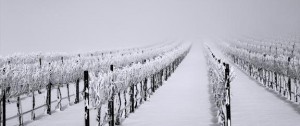French Wine Climate Crisis
Is there really a French Wine Climate Crisis? And if so – What does it mean for French Wine lovers Worldwide?
Remember that old song -“There’s got to be a morning after?” – well…that’s sorta how DA BG feels after my LAST POST, which extolled the ecological progressivness of the froggie wino industry.
But, verily, I say unto you, the climate, like the times, certainly be a changing. How much and how quickly are the most obviously important questions.
Maria Doezema, my wino pal in the frozen North(where the climlate never changes) has the liquid disaster scenario details:
“In 20 years, the English will be making Grenache from Chateauneuf-du-Pape,” says Herve Lethielleux, co-owner of L’Etiquette, a wine boutique in central Paris, about a wine variety from subtropical southeastern France.
That’s because the changing climate is affecting the delicate balance of weather, soil and other factors that are central to the production one of their main commodities, something that’s already had a visible effect elsewhere around the globe.
“If you look at Tasmania, it was too cool to grow grapes 25 to 40 years ago,” says Gregory Jones, a research climatologist at Southern Oregon University, about the wine-producing region of Australia. “Today, it’s clearly much more suitable.”
For French winemakers already keenly feeling the effects of growing competition from other countries, higher temperatures in recent years have meant grapes with lower acidity and higher sugar content. That makes for higher alcohol and fruitier — some say cloying — wines.
“As you get older you don’t want those hugely alcoholic fruit bombs,” says Juan Sanchez, owner of Le Derniere Goutte, a wine shop on Paris’s storied Left Bank.
In France, where wine is an important part of social culture, “alcoholic fruit bombs” are also counterintuitive to the typical palate. Usually paired with food, wine is generally intended to enhance rather than overpower. “You almost don’t want to eat with those kinds of wines, they’re like a meal in themselves,” Sanchez explains.
Lethielleux says many of the winemakers with whom he works have been documenting gradual but persistent changes in climate over the past decades — and noting increasingly earlier harvest dates with growing alarm. “The grapes just aren’t ripening properly,” he adds.
Such concerns raise an increasingly common question: “Will people have to change what they’re planting to adapt?” Sanchez says.
That’s easier said than done, thanks to the strict French system for categorizing wines. They can be classified as AOC — appellation d’origine controlee, or controlled designation of origin — only if they conform to certain varietal constraints in each region.
Drastic changes to grape varieties — even in response to potentially ruinous climate change — can be a risky business for growers. “You can do it but you lose the appellation,” Lethielleux says. “If you’re not a great winemaker, having your wine declassified means you can’t sell it at the same price anymore.”
The changing environment is starting to shake a system that’s been central to European wine for centuries. “Europe has historically been about regional identities based on varieties of wines and particular styles,” says Jones, a specialist in the study of climate structure and suitability for viticulture.
“Those that have adaptive capacity in the face of climate change are going to be much more able to adapt across a range of different climate futures,” he adds.
However, climate change is nothing new in the earth’s history, he points out. “Today the issue is that our agricultural systems are much more fixed,” he says, “and our investments in our agricultural systems are much more fixed.”
Despite the rising concern, Jean-Pascal Goutouly, a researcher at the Institut des Sciences de la Vigne et du Vin, part of the National Institute for Agricultural Research in Bordeaux, says full-on crisis mode hasn’t yet arrived. “Things are okay for the moment,” he says. “We still have the possibility to adapt to the conditions.”
As this year showed, it’s not only warmer temperatures and earlier harvests that are affecting wine, but more volatile weather in general.
“This is a bad year — a lot of disease, a lot of rain, a late spring and a summer that never arrived — and it was dreadful with hail,” Lethielleux says. “The grapes are all stressed: They’re full of sugar, but they’re not ripe.”
Weather fluctuation of more than “two or three times more than what you’re used to” may jeopardize the entire French viniculture system, Jones says, adding that the main threat is the combination of factors.
“France has a long, rich history of growing grapes and making wine,” he says. “Production has varied, there are good years and bad years, and French wine growers have always dealt with that.”
Read more HERE.
THROW ME A BONE HERE, PEOPLE!
What are ya thinkin’?


looks like climate change is something we all have to deal with!
i see your point about the regional identities dissappearing..but what can be done?
paula…i hear you…..and i think is pretty much the same as what’s happening with regional products all over europe now with paper pushers in brussels homoginizing everything in the name of consistency.
as you’ve stated in he post, i’m wondering how all this will affect AOC. any thoughts readers?
hey brian, my take is that whatever the changes, i think AOC will bne able to roll with them.
hey people..my 2 cents….i think that that brussels will continue to run the show….meaning the AOC designation may not survive the
“dumbing down.”
what many of your readers may not know (tho’ i’m sure you do)…the AOC certification is already being “dumbed down” by such additional classifications as “OGP” (origin geogaphique protégé)- which, to me, is total nonsense. so the region is geographically protected. what relation does this have on the quality of the region’s products? absolutlely none!
totally agree with you mr carter, although this is the first of heard of this “protected” classification.
in spite of all the negative predictions here i think the last paragraph pretty well sums it up…..the French have adapted before.
no reason they’re going to stop now. just sayin’
i think the french can get a handle on the climate thing with no problem…..and i have nothing against those “alcholicfruit bombs!
very informative post! and, as you said, 180 away from your last one…which is good..i mean the fact that you always give us both sides of the story!
really..i thik no matter what the climate or the regulations from brussels….the french always seem to find a way. as our cousins down under would say : “no worries!”
always enjoy your osts on wine..and this is one of the best and most informative!
really like the way you try to show all sides of the story…thinkin about the tasmania angle….keep it up!
to me this is pretty much a non-story. the last paragraph says as much. climate change. who deals with it? everyone. in every country. in every profession. not up to your usual high standard.
i agree with lena…climate change is a fact of life affecting us all…..however..her comment not withstanding…i believe it’s helpful and interesting to see how different industries/profession are affected..;and how they’re coping with it.
very appropriate post for winter!
your wine related posts are appreciated…but i’m longing for more of your personal adventures.
i’m with ya there 100% rand!
if i recall correctly you did a post a while back about the french experimenting with underwater wine storage. my point – if the french can innovate like this….no worries about them adapting to climate change!
mandy…your absolutely right. they’ve got the “get go” and then some!
mandy….one small point regarding your choice of the word “innovate”…if i recall that post the french were simply picking up the technique of the ancient romans…..whereas “innovate” gives the impression it was totally their idea.